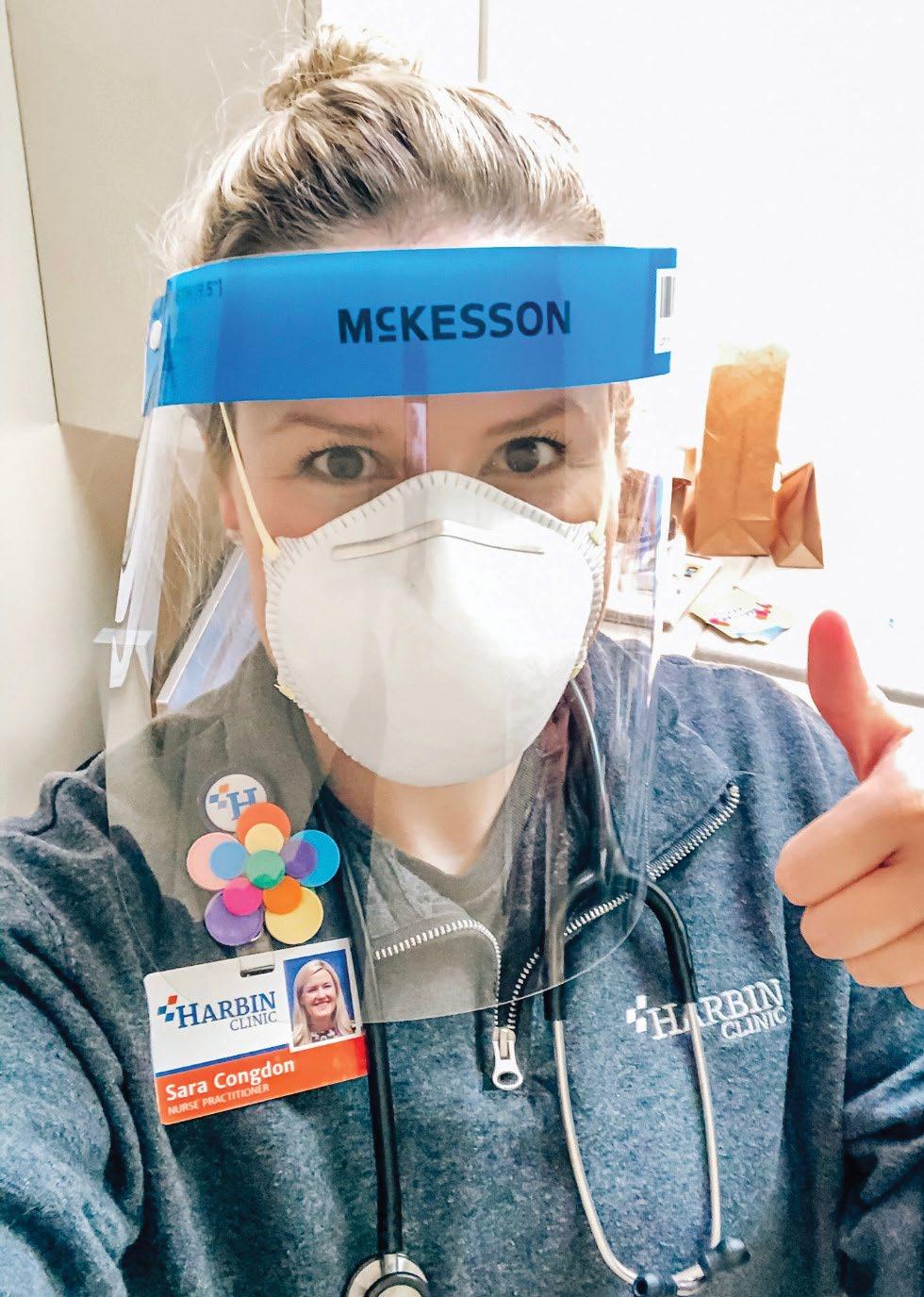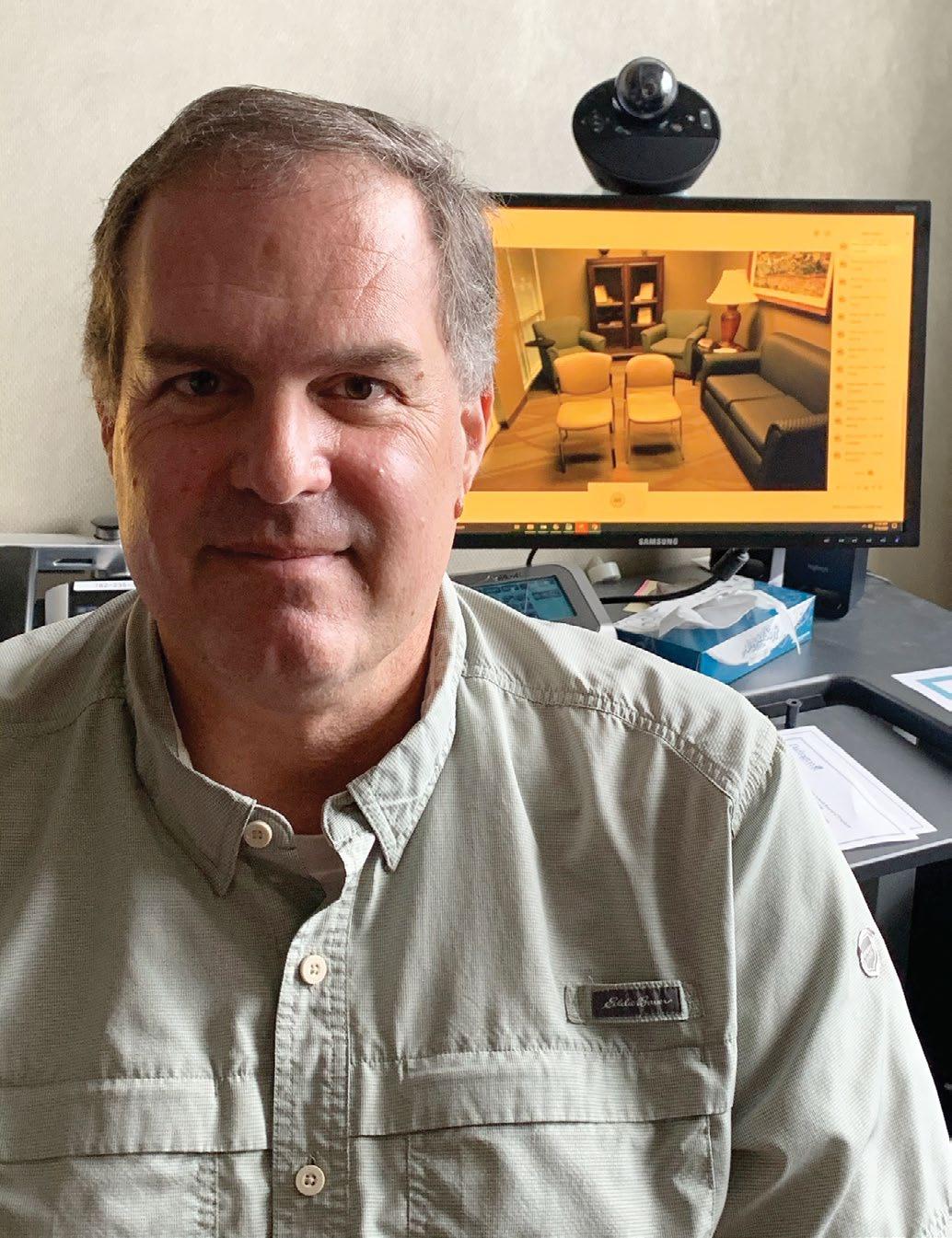
6 minute read
Healthcare Heroes
COVID-19 has disrupted our world and no one knows that better than the medical professionals who see it every day. In the next few pages of this magazine, several members of our school community who work in the field of healthcare share firsthand their observations, challenges and sources of inspiration. Thank you to everyone in the Darlington Community and beyond who has dedicated their life to caring for those in need. You are heroes!
cardiac nurse at Emory St. Joseph’s Hospital Advanced Heart Failure Center in Atlanta, says it has been a humbling season to serve as a nurse. “We have been seeing more and more of our patients who have contracted the virus and have thankfully recovered. However, in some cases, the virus has caused a worsening of their heart failure, which has been a challenge for many of our affected patients,” she said. “Patients and families have been gracious to ask about my well-being during this time, and have brought us extra food and snacks as a token of their appreciation. The community has rallied around us, posting signs of encouragement and support. In such divisive times, it has been refreshing to see the community come together in supporting each other.”
As an emergency medicine resident at the University of Kentucky, Dr. Jack Yancey’s (’10) focus with all patients is resuscitation and stabilization. “This is particularly important with COVID-19 patients or any patients presenting with respiratory distress,” he said. “The spectrum of disease severity is wide, so this can range from immediate intubation and ICU care to observation, reassurance, and discharge home after discussing what to expect and when patients need to return to seek medical care. Working as a resident in the middle of a global pandemic has opened my eyes to just how quickly medicine
Blair (Stegall) Bowden (’03), a can change.”


Sara (Pate) Congdon (’08), primary care pediatric nurse practitioner at Harbin Clinic in Rome, says acute sick visits are common in the fall and winter months, especially this year with COVID-19. “One of the most important roles I have in these uncertain times is providing patients and their families with tangible things they can do to help stay healthy -- wash hands, wear a mask and socially distance,” she said. “We have seen an increase in children and teens with anxiety pertaining to all the uncertainty in their lives and routines. This has created a unique opportunity for me and my colleagues to not only care for their physical ailments, but also care for their hearts and minds in these uncertain times.”

Jennifer Peacock (’07), ICU nurse at Floyd Medical Center in Rome, says working on the front lines of COVID-19 has forever changed her, both personally and professionally. “It’s hard to quantify what holding someone’s hand when they die so they won’t be alone feels like or how to put into words the defeat you feel talking to someone one day and losing them the next,” she said. “But that’s just the nature of the beast we face sometimes in healthcare. For me, it further solidifies that we should never take a moment for granted and live each day with passion and purpose. Loving one another is powerful, and my hope is that we don’t lose that sentiment as the virus drags on.”

Dr. Darshak Pandya, Darlington parent and pulmonary/critical care physician at Harbin Clinic in Rome, and his partners are responsible for the care of the sickest people with COVID-19. “There has been a significant outpouring of goodwill from our community,” he said. “This appreciation goes a long way and helps reenergize me and my colleagues to keep up the good fight. The unified spirit of the entire Rome medical community to come together and deliver the most aggressive and best care that we possibly can under these circumstances has been inspiring.”
HealthcareHEROES

Dr. Matt Mumber, Darlington parent, Board member, and radiation oncology specialist with Harbin Clinic in Rome, has had to shift to providing essential anticancer therapy to his patients mostly virtually since the start of the pandemic. “COVID-19 has made me more aware of the preciousness of human interactions,” he said. “It has been difficult seeing patients mostly by computer screen. There is something about being with a person in person that I took for granted. My patients and staff inspire me every day by showing the courage to live their lives in such a way that they are a service to self and others. It has been inspiring that patients will ask me how I am doing and encourage me to stay safe, while they are going through a major health crisis.”
Dr. Rob King, Darlington parent and otolaryngology specialist with Harbin Clinic in Rome, spends his days navigating the diagnosis and treatment of diseases of the ears, nose, and throat, most of which present with symptoms indistinguishable from those associated with COVID-19. “This pandemic has fundamentally changed the way doctors interact with their patients,” he said. “Simple smiles are no longer shared. Hearing-impaired patients who rely heavily on lip reading are even more isolated from us behind our masks. Every clinical interaction is approached through the filter of potential exposure by both provider and patient, greatly affecting the intimacy and collegiality of the once-sacred doctor-patient relationship. The personal connection that had become the most rewarding aspect of being a physician is palpably
diminished.”


Dr. Steven Winkler (’72, LD
’15), administrator at Hematology Oncology Clinic in Baton Rouge, La., spent the first weeks of the global pandemic making sure that the clinic had sufficient staff, personal protective equipment, and supplies to care for patients. “The best part of these situations is that the staff comes together to do whatever it takes to take care of the patient,” he said. “That has to be one of the most rewarding parts of my job. The staff will make it work no matter what. My wife, Monica, chief nursing officer at Baton Rouge General, traded her street clothes for scrubs and worked over 90 days straight before taking a day off to make sure everyone was taken care of – patients, staff and physicians. We celebrated those that the recovered and cried with the families of those that did not survive.”
Kinslee Clevenger (’15), CCU nurse at Redmond Regional Medical Center in Rome, has worked exhausting hours, especially at the start of the pandemic, but she says she has felt supported by the community and her colleagues in healthcare all along the way. “There are so many examples,” she said. “Robin Cater, one of the managers at Floyd Medical Center, gave me her personal P100 N95 respirator mask that she did not need so that I could have extra protection, and I have worn it every day. This has been a difficult time for everyone, but it is definitely inspiring to be able to watch people recover from grave illness and return home to their families.”


Maggie Beth (Atha) Ralston (’14), ICU nurse at Floyd Medical Center in Rome, has been caring for critically ill patients in the designated COVID-19 ICU since the start of the pandemic. “This has forced me to grow up a lot as a young nurse,” she said. “I’m fortunate to have spent my first year surrounded by very intelligent nurses who helped mold and prepare me for what this pandemic has thrown my way. I’ve been inspired by people's strength and faith, and am ever-thankful for the nurses that show up every day and night and mask up countless times each shift to do all of the simple and tough tasks in full PPE. I’m so lucky to be at the bedside with these people.”




